Meet 4 new IU Bloomington faculty members
By IU Bloomington Today
September 06, 2024
Open gallery
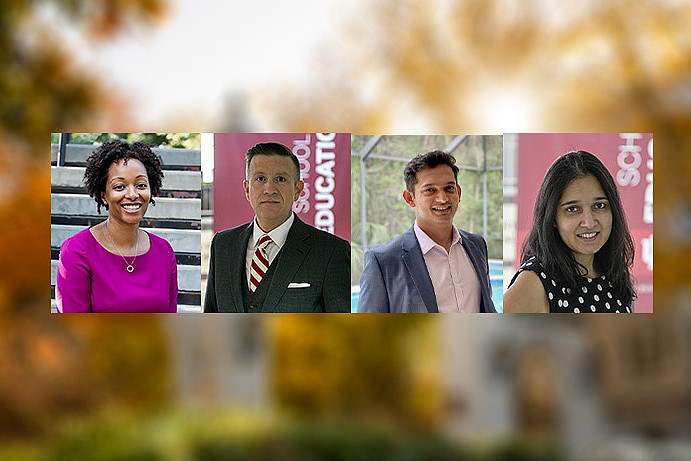
The start of the fall semester at Indiana University Bloomington welcomes a cohort of more than 300 new faculty members.
Among the 312 new faculty:
- 37% are researchers.
- 32% are tenured or tenure-track faculty and librarians.
- 19% are visiting faculty and visiting librarians.
- 12% are lecturers, clinical faculty and professors of practice.
The cohort represents 39 countries. Fifty-three percent are women, and 46% of the new faculty are people of color. Of the tenured and tenure-track cohort, 84% have degrees from an institution that is an Association of American Universities member or an international university. Among tenure-track faculty who completed their degrees in the U.S., 66% earned their degrees at an AAU institution.
“We are excited to welcome this talented group of new faculty to Indiana University Bloomington,” said Carrie Docherty, vice provost for faculty and academic affairs. “Their diverse experiences and expertise will bring valuable perspectives and energy to our campus and continue to enhance our commitment to academic excellence and innovation.”
IU Bloomington Today caught up with four new faculty members to learn more about their backgrounds, their research and their thoughts about the Bloomington campus and community.
Ayesha Hardison
Associate professor, Susan D. Gubar Chair, Department of English, College of Arts and Sciences
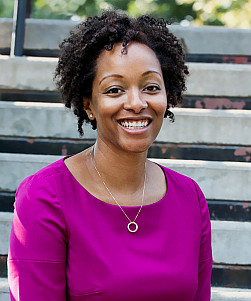
She authored “Writing Through Jane Crow: Race and Gender Politics in African American Literature,” winner of the Nancy Dasher Award and a Choice Outstanding Academic Title. She’s director of the History of Black Writing project and co-editor of the journal Women, Gender, and Families of Color.
Question: How would you describe your research? How did you get interested in this area? Why is it important?
Answer: My research explores African American literature and culture from the mid-20th century to the present. I am a literary historian who tends to focus on Black women novelists, which are too often understudied in comparison to their counterparts within earlier periods of the tradition.
I became interested in my field because I am a reader. My mother is an avid reader, and she instilled a love for fiction in me at a young age. I think my work is important for understanding the unique experiences and ideas of Black women as well as the diverse ambitions, practices and richness of African American cultural expression more broadly — essentially the goals of the humanities.
Q: What appealed to you about coming to Indiana University?
A: I am excited to join Indiana University because of the English department’s prestigious reputation and the institution’s investment in Black cultural archives. I am honored to be the Susan Gubar Chair, which is named after the distinguished professor emerita of English who made foundational contributions to the study of gender and literature.
Given that I direct the History of Black Writing, a literary recovery and preservation project, campus resources like the Black Film Center and Archive, the Archives of African American Music and Culture, and the African American Arts Institute make IU a dynamic place for me to continue complementary work.
Q: What is something people should know about you?
A: I love theater, art and film. In terms of the latter, I enjoy various genres that generally make me think and question, or specifically make me reflect on aspects of the human condition. I also enjoy a wide range of television shows. The appeal for me in all these cultural productions is their visual aesthetics and storytelling.
Richard Allen Carter Jr.
Ted S. Hasselbring Chair in Special Education Technology, School of Education
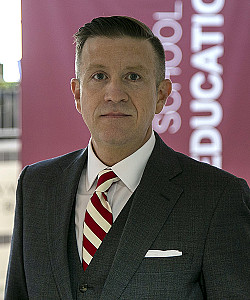
Carter researches the education of students with disabilities in modern learning environments, with a focus on technology-enabled personalized learning, virtual learning and blended learning environments. He is affiliated with the Council for Exceptional Children’s Innovations in Special Education Technology Division.
Q: How would you describe your research? How did you get interested in this area? Why is it important?
A: My research focuses on the design and development of conversational agents to provide methodologically sound instruction to students with disabilities in face-to-face and remote learning settings. Devices equipped with Apple Siri, Amazon Alexa and Google Assistant do a great job of answering discrete questions such as mathematics facts. My goal is to investigate how we can embed sound methodological teaching practices into student interactions with conversational agents, and ultimately determine student achievement outcomes.
I began this work in 2019 when devices with conversational agent capability were becoming more ubiquitous. My interest was solidified during the 2020 COVID-19 pandemic. Our team developed multiple conversational agents that were designed to provide information to families that were thrust into the role of teachers. Students are engaging with instruction on digital devices at increasing levels. Conversational agents have the potential to be the guided support and structure that students can use to maximize their learning experiences using digital technologies.
Q: What appealed to you about coming to Indiana University?
A: IU has long been recognized as an institution that produces leaders in special education. The current faculty maintained and even exceeded this standing. The doctoral students that IU has produced have become impactful names in the field. One of those doctoral students, Ted S. Hasselbring, is widely held as a forerunner of integrating technology into classrooms.
I am honored to be the inaugural Ted. S Hasselbring Chair of Special Education Technology. The personal challenge of holding this position is exciting. Technology in special education is entering an exciting phase with the advent of generative AI. There’s a need to ensure that AI use in special education is applied appropriately to diverse populations. The Ted S. Hasselbring Chair of Special Technology can be uniquely positioned to serve as a leading AI developer and steward.
Q: How will working at IU help you further your research?
A: It affords me access to IU’s world-class scholars and resources that will allow our team to keep asking big questions and looking for solutions as special education evolves. IU’s faculty represent leaders in multiple aspects of the field. Working closely with these leaders will afford me the opportunity to collaborate on topics central to special education.
I am interested in crafting a partnership with the instructional systems technology faculty. When I was completing my doctoral work, the authors I found myself citing most were members of this program.
Ankit Shah
Assistant professor of operations and decision technologies, Kelley School of Business
Payal Shah
Visiting assistant professor of early childhood education, School of Education
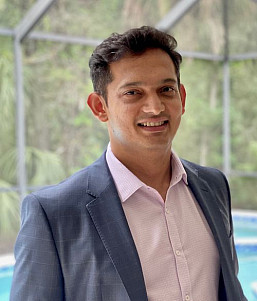
Ankit Shah comes to IU from the University of South Florida, where he directed its Artificial Intelligence Research Laboratory for Secure and Efficient Systems. At IU, he is also deputy director of cybersecurity for the Kelley School’s Data Science and AI Lab. His mission is to advance cybersecurity by pioneering AI-driven research to enhance security and safeguard AI-enabled systems. His research has been sponsored by the Department of Defense, the Department of Homeland Security and industry partners.
Payal Shah joins the School of Education as a visiting assistant professor in the Department of Curriculum and Instruction. She holds a Ph.D. in education with a specialization in early childhood education and a secondary concentration in teacher education from George Mason University. She brings extensive experience in research, particularly in the areas of early childhood education, educational technology and teacher training.
Q: How would you describe your research? How did you get interested in this area? Why is it important?
Ankit: My research aims to enhance organizational cybersecurity. By developing artificial intelligence and machine learning technologies, my focus is on improving how we identify and counter threats. Cybersecurity remains a critical national issue as adversaries also leverage these technologies to outmaneuver defending organizations. My research investigations are centered on understanding these evolving threats, identifying weaknesses in our defense systems and augmenting human decision-making with this knowledge.
My interest in cybersecurity was sparked by firsthand experience with cyberattacks during my time in the industry. Facing these challenges motivated me to focus my research on proactively identifying vulnerabilities in the systems and enhancing our ability to detect and respond to threats effectively.
Payal: I am passionate about preparing educators to provide safe and well-designed 21st-century opportunities in early childhood education that foster innovative thinking and learning alongside socio-emotional development. I got interested in this research during my master’s program, where I saw the potential for technology to enhance educational experiences and improve pedagogical strategies.
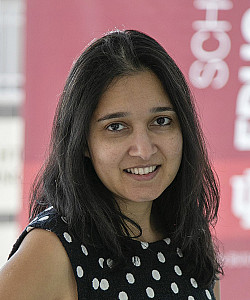
Q: What appealed to you about coming to Indiana University?
Ankit: Being hired as part of the new cohort for the core research area of cybersecurity under the Faculty 100 initiative offers a unique opportunity for making impactful collaborations across the campus. The presence of OmniSOC, the only collaborative multi-state institution security operations center in higher education, the Center for Applied Cybersecurity Research and Kelley’s Data Science and Artificial Intelligence Laboratory makes IU Bloomington an ideal environment for cybersecurity researchers like me to thrive and contribute both to the campus and the broader research community. Additionally, IU provided a dual career opportunity for my wife.
Payal: Indiana University is renowned for its research excellence and commitment to fostering impactful, interdisciplinary research. Given my passion for interdisciplinary research, I am excited by the prospect of collaborating with esteemed scholars across various fields to advance my work on technology integration, early childhood education and teacher well-being.
Q: What is something people should know about you?
Ankit: I am an optimizer with a passion for bringing new ideas to life. Whether it’s streamlining processes, improving systems or finding innovative solutions to complex problems, I am motivated to make things better and more efficient. Just recently, this passion led to the issuance of my first U.S. patent, earning me the proud title of “inventor” in the eyes of my kids.
Payal: I have lived in three countries, speak three languages and love to dance. As a family, we love exploring different places and cultures. Beyond my academic and research interests, I am deeply committed to community service and mentoring.